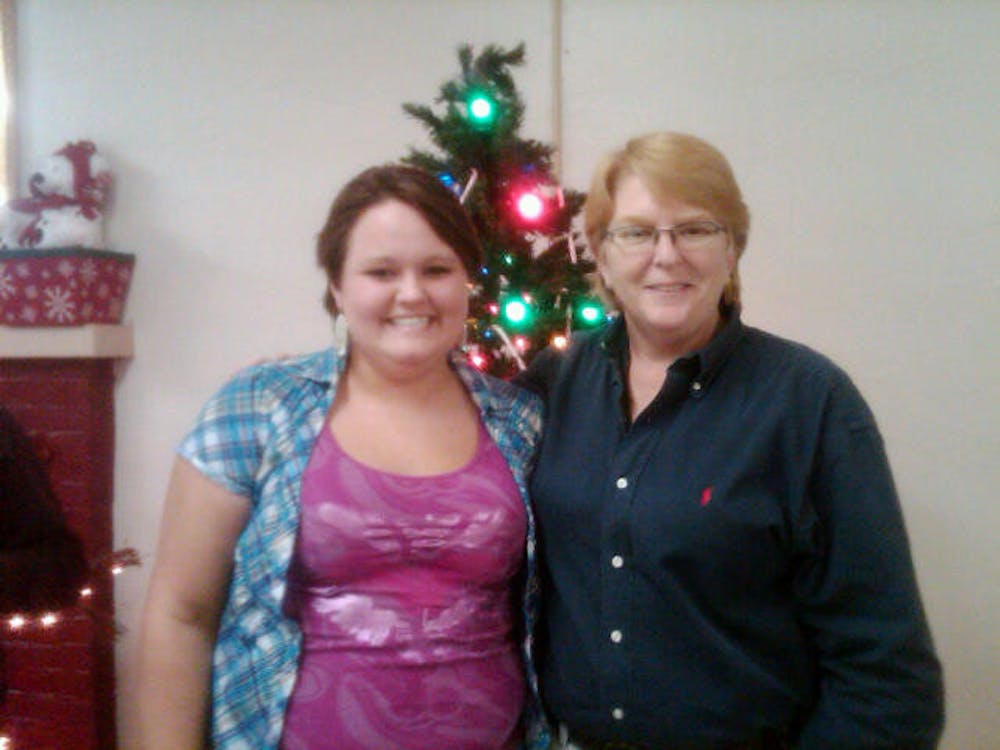Four men wait in the front room for their names to be called. One leans against a wall, another sits in a chair. The woman in front shuffles paper, then calls one of the men forward.
“How was your day?”
“How is school?”
“How’s your new girlfriend?”
She hands him a check from the state of Florida, his monthly stipend as a former foster child.
Another man comes in the door, says hello and heads toward the back office to chat with Rhonda Lockwood. As they catch up, the caseworker in the front room hands another person a check.
For these young men and women, this may be as close to a homecoming as they ever get. While some college students drive hours to go home on an occasional weekend, they show up on the first of the month, every month, to pick up a check from the state to cover their education and chat with the employees who have, in many cases, known them since they were 13 years old.
Lockwood, 50, is the northwest regional coordinator at CDS Family and Behavioral Health Services Inc., which runs an independent living program for foster care children ages 13 to 23 that teaches them about time management, hygiene, financing and a host of other skills.
She has seen children take their first steps into the world as adults, finally free of the system in which they were raised.
For some, she’s just an employee they see on occasion. For others, she is the closest thing to a parent they’ve ever had.
Many kids learn about cashing checks and doing laundry from a parent. They learn to tie their shoes, ride a bike, throw a fastball, feed the puppy, clean the house, cook macaroni and cheese, drive a car, open a bank account and everything else in between
For children in the foster care system, there often aren’t any dependable adults to teach them these things. In fact, there are no parents.
She may not be a parent to the 250 or more kids she works with, but she’ll have to do.
***
Farron Sanders is new to adulthood. He moved into an apartment with his brother, 19-year-old Darrius, on Oct. 15, the day he turned 18. For a boy who was bounced among foster homes from the time he was 8 years old, it’s the first place that’s ever really been his — even if it is just a lease. He’s still getting used to the idea that he’s on his own.
Sometimes he calls Lockwood or drops by the CDS office to talk. Other times she just drops him a line to answer a quick question. Sometimes she drops Farron and his brother off at the grocery store. And sometimes, she drops everything to help him out.
Farron walks into the back room of CDS, where Lockwood sits at her desk talking to a caseworker.
“Hey, Farron. What’s going on?” she asks him, running a hand through her short blond hair.
“Lost my ID,” he replies. Without an ID, he won’t be able to cash his check.
“Have you looked in your pockets? Your room? Under the couch?
“OK,” she says. “We’ll just have to get you a new one.”
They’ll have to pick up his Social Security card from his apartment first. They’ve got a couple hours before offices close. She gets up, grabs her keys.
Farron may be out of the program, but he’s not out of her sight.
Although Lockwood’s job is to take care of the foster kids at CDS, she makes sure to take care of herself, too. She goes for walks, cooks healthy meals and takes a vacation every three months or so to relax.
Lockwood, who has never been married, lives with two labradoodles named Emmitt and Maude and a Havanese named Buster. While she has no kids of her own, she helped raise a couple of family members’ children during rough times. Her family’s history of alcoholism sometimes meant taking on the role of temporary guardian for a child.
She took care of one boy, Tony, from age 12 to 18, and cared for a girl named Ruth until she was 5. Now they are grown with their own families, but she knows they’ll call if they ever need help or friendly advice.
Whether she’s caring for family members or the foster children at CDS, she is available to help with any of their problems. If she isn’t there when they run into trouble, she is always only a phone call away.
Lockwood’s job is a hands-on, 24-hour-a-day responsibility. Kids don’t have crises on a 9-to-5 schedule. The big problems — they can happen at 11 at night or at 4 in the morning.
The only time she usually silences her cell phone is when she’s in a movie, and even then she calls another employee to let them know that she will be unreachable for a couple hours. On the drive to Farron and Darrius’ apartment, she talks about everything with the two boys. They talk about previous foster care kids who are in prison, in college, pregnant, married, missing, found, sad, happy.
While some kids do become criminals or drug addicts, in her experience it’s not as widespread as some people believe.
They talk about the stupid things some of Rhonda’s charges have done — some silly, and some dangerous but darkly humorous. Farron mentions a friend of his named Curly who was involved with CDS.
“Isn’t Curly the one who shot himself in the foot?” Lockwood asks Farron and Darrius
“In the leg,” they both answer simultaneously.
“I was on vacation and he called me [about that],” Lockwood recalled.
There have been kids who have ventured down a dangerous path, and she hasn’t been able to help right away. Sometimes they just don’t want her help.
“You can only go out to somebody’s house so many times and have them tell you to get lost,” she says. “You say, ‘OK, come see me when you’re ready.’ We’re kind of like the hand that feeds you — later.”
As the conversation drifts, Darrius asks if they want to hear an animal joke. She tells him to go for it.
He says he was at the zoo on Halloween and saw a tiger. He was wearing a costume, so he jumped out at the tiger and scared it.
“I said, ‘Hey, stop being such a ’fraidy cat.’”
Darrius starts to laugh as Lockwood and Farron chuckle slightly and sigh.
***
The key to the Lockwood job is resilience.
When foster care children join the program, it takes time to earn their trust. They’ve been spurned before by biological parents and foster parents, and they expect her to be no different.
She watches what she says around them. Every person has a different trigger. For some, calling an idea stupid is the same as saying they are stupid. A slip of the tongue can cause a rift, which she then has to mend.
Working with children at CDS is not parenting. There are limits she faces that parents don’t. For example, if a former foster care child wants to come with her on a trip to Tampa, they have to find a separate sleeping arrangement because they can’t stay in her hotel room overnight.
She can’t shower them with gifts, although she does try to do something for them on special occasions, whether it’s a birthday dinner or the small cookbook she gave to one of her CDS kids, Jessie, for her high school graduation.
Although she is not their mother, in many ways she thinks like one. She thinks about the children at CDS all the time. Maybe she sees a cool item in a store window that one boy might like. Maybe she hears a joke that might make one of them laugh.
Everywhere, she is reminded of these children.
One of her favorite memories is of taking three kids — Aaron, Dennys and Shelby — out shopping for outfits for Barack Obama’s presidential inauguration, which they were allowed to attend.
They visited one thrift store after another, and Lockwood watched excitement flash across their faces in each shop as they searched for the perfect outfits.
She teaches foster care children what she can before they age out. They learn about car maintenance, hygiene, checkbooks, cooking and more.
After aging out, many still call her with questions or just to check in. They know she likes to cook, so they’ll come to her with cooking questions.
Watching them leave the system is tough because it means letting them figure things out on their own.
“It’s a tricky little dance that we do,” she said.
Some won’t call for a while. Not knowing makes her nervous. If they need time to themselves, that’s okay. She just needs to know that they are safe.
She’s often one of the few adults who have really watched them grow up.
“You hope you’ve done a good job,” she said, echoing a favorite line of parents as their kids graduate from high school. “They’re going to do what they’re going to do.”
Even when her foster care children leave the system behind, they’re still connected.
Andrea Houtman, a 21-year-old senior at UF, entered foster care at 11. She bounced between homes with her older sister, Jennifer, now 23, and for a time lived with her younger brother Todd, now 17, and older brother Danny, now 26.
Social workers would show up at her foster homes late or not at all, wouldn’t follow protocol, and wouldn’t seem to care about her or her situation. She always thought that when she turned 18, that would be it. She wouldn’t be a “foster care kid” anymore.
But after almost four years in college, she still visits CDS once a month to pick up her stipend and talk to Rhonda and the other employees. She glosses over her past with her roommates, choosing not to tell them she lived in foster care because of the uncomfortable questions it raises.
When students complain about their mom calling too much or their parents always wanting to visit, she can’t relate. She would love to have those problems. She wonders what to tell a boy about her past when they go on a date. When he asks her about her mom, how does she explain that she doesn’t have one?
CDS taught her many skills, although she had already learned plenty of them as a child growing up with an alcoholic father and a bipolar mother, often fending for herself.
Because she was living in a supportive foster home, she didn’t need to rely on CDS as much as other children.
But she liked how the caseworkers would always ask her how her day was, how school was, how life was. It made her feel like she mattered.
***
Lockwood pulls up to the sidewalk in front of Farron and Darrius’ apartment. Farron jumps out to get his Social Security card.
As Farron walks in the door, he heads past the living room filled with furniture and boxes. He’s still unpacking and ordering his new life, one box at a time. He grabs his card, heads out the door and walks to the office.
As he walks in, Rhonda looks over and smiles. Someone in the laundry room found his ID. Crisis averted.
But he still needs to cash his stipend check and could use some help — it’s his first installment since he turned 18.
Lockwood checks the time. It’s only 3:30 p.m. That’s enough time to drop by CDS quickly and then head to the bank. Then she’s packing up furniture and driving to an apartment that one of her previous foster care children just rented.
Looking down the barrel of a long evening, Lockwood nods to Farron.
OK, she says. We’ll go to the bank before it closes.






